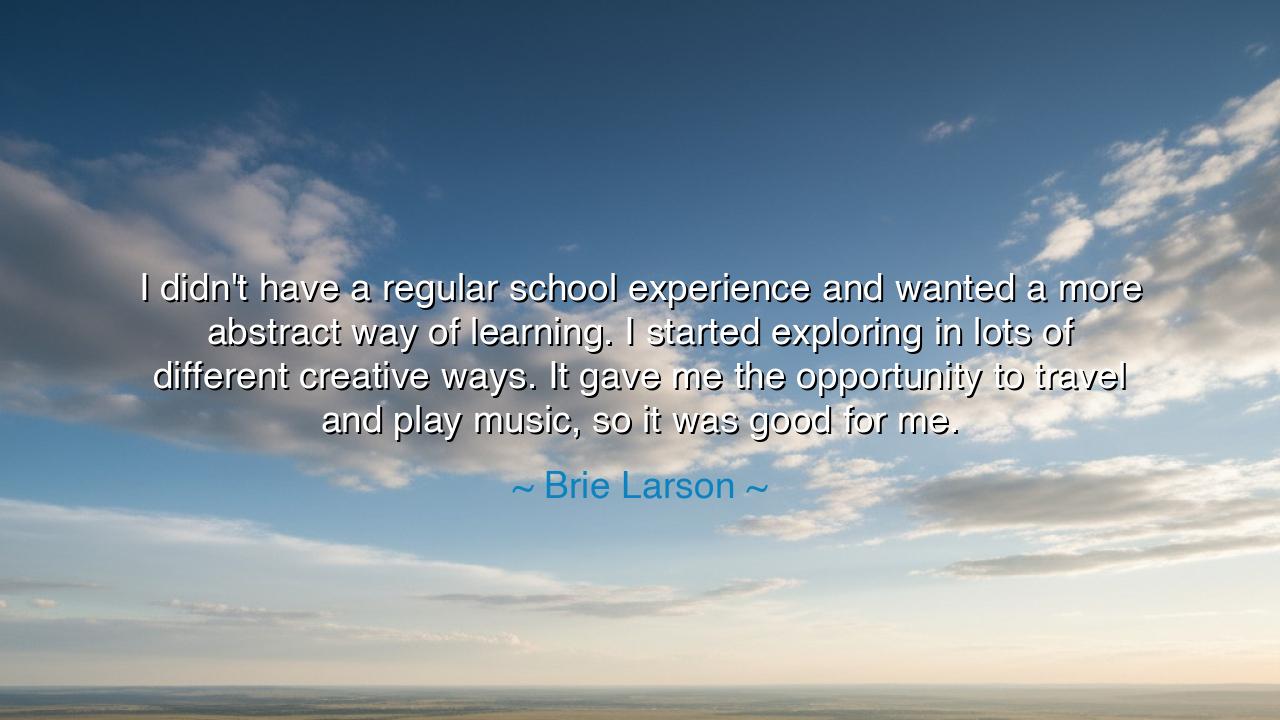
I didn't have a regular school experience and wanted a more
I didn't have a regular school experience and wanted a more abstract way of learning. I started exploring in lots of different creative ways. It gave me the opportunity to travel and play music, so it was good for me.






"I didn’t have a regular school experience and wanted a more abstract way of learning. I started exploring in lots of different creative ways. It gave me the opportunity to travel and play music, so it was good for me." Thus spoke Brie Larson, revealing a path that many fear to take: the path away from convention, toward discovery through freedom and creation. Her words are the confession of one who sought not to be bound by rigid patterns, but to cultivate wisdom through abstract learning, through the wide fields of exploration, and through the daring embrace of her own curiosity.
The ancients themselves knew that learning is not one road but many. Did not Socrates, who had no school in the sense we know today, teach through questioning in the public square? Did not the poets of old learn not in classrooms but in journeys, in stories, in song and the rhythm of life itself? What Brie Larson calls an abstract way of learning is in truth the oldest way: to learn through the living of life, through the act of creation, through the courage to make mistakes and turn them into wisdom.
Her choice opened doors. She speaks of travel and of music, those twin teachers that have carried countless souls into new worlds. For travel widens the eyes, teaching us that the world is vast, filled with peoples and ways unlike our own. And music opens the heart, showing that truth is not only spoken in words but sung in tones, rhythms, and harmonies that cross every border. By choosing to step outside the narrow walls of "regular school," she gained teachers older and broader than any single institution: the earth itself, and the language of art.
History gives us examples of such journeys. Leonardo da Vinci, though denied the formal education of the wealthy, explored ceaselessly: dissecting bodies, sketching machines, studying birds in flight. His "abstract learning" created wonders that no formal system could have given. Or consider Rabindranath Tagore, who abandoned rigid schooling as a boy and instead cultivated poetry, philosophy, and music—becoming a voice of both East and West. Their paths, like Larson’s, remind us that creativity is a form of learning, and that freedom can be as much a teacher as structure.
Children of tomorrow, learn this: the measure of your knowledge is not whether it came through regular paths, but whether it made you grow. Some thrive in schools; others thrive outside them. Do not despair if your way is different. The world has room for many forms of wisdom, and often the most creative explorations bear the richest fruit. The question is not, “Do I walk the same path as others?” but, “Am I walking a path that awakens my spirit?”
Practical wisdom lies close at hand. If you find yourself restless in the ordinary ways, seek your own methods of learning. Explore through art, through travel, through experiment. Create music, write stories, build with your hands, speak with strangers, listen to the silence of mountains and seas. Let these become your classroom. But also remember: whatever path you take, commit to it with discipline and joy. For freedom without dedication is wandering, but freedom with devotion is discovery.
Thus the lesson is clear: learning is not confined to the walls of a school. Brie Larson’s words remind us that life itself is a great teacher, and that to follow the thread of curiosity may lead us to wisdom deeper than we imagined. Let us then honor every path of knowledge—structured or abstract—and live with courage, creativity, and openness. For the true aim of learning is not simply to be taught, but to be transformed.






AAdministratorAdministrator
Welcome, honored guests. Please leave a comment, we will respond soon